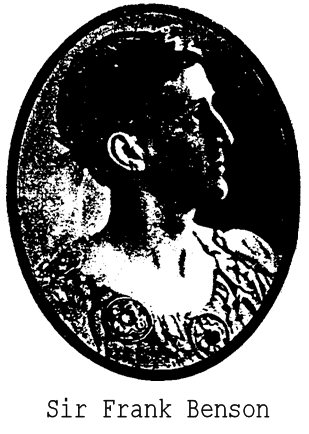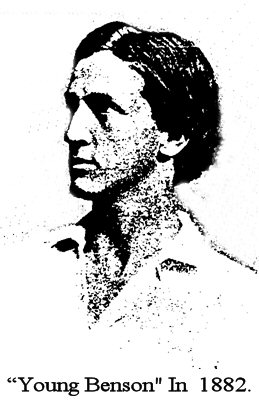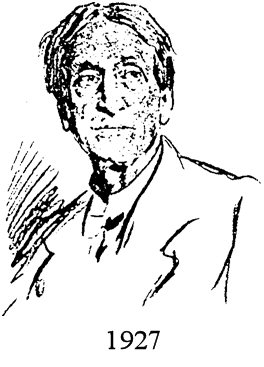52 - SIR FRANK BENSON
by Ann Pennington.
The proudest moment in the life of Frank Benson occurred when he was knighted by King George V during the tercentenary performance of Julius Caesar at Drury Lane in 1916, the first actor to be so honoured within the walls of a theatre. Previously he had been awarded the Freedom of the Borough of Stratford-upon-Avon for his services to Shakespearean theatre.
Francis Robert Benson, known by his family as Frank and almost invariably by his fellow Thespians as F.R.B. was the fourth child and third son of William Benson, descended from Quaker stock, and Elizabeth Soulsby Benson (nee Smith), reputed to be one of the most beautiful women of her day. Their grave and memorial is in the New Alresford churchyard.
Born in Tunbridge Wells on 4th November 1858, Frank Benson was quite a little boy when the family moved to Langtons, now Langton House, at the corner of East Street and Sun Lane in Alresford. Both house and grounds are much smaller now than when the Bensons, their six children and a battalion of servants lived there. The property included the farm with its paddocks, pastures, stables and grounds with long sloping lawns, flower walks and an enclosed kitchen garden. This was the home Frank Benson remembered in later life with almost passionate affection. Throughout his schooldays his main interests were physical fitness and the love of word and rhythm. In his two final years at Winchester he was Head of House (Wickham's) and had won the straight mile, appropriately on the Alresford road.
Frank's childhood at Alresford with his brothers and sisters would have been idyllic. The garden at Langtons overlooked Old Alresford Pond, the Sheep Fair Field and a large meadow where the sports and entertainment of the town were held. At sporting events butchers and buyers, carters and bailiffs, drovers, tramps and beggars jostled, yelled, bargained and shouted. Sometimes Sanger's Circus would arrive, though the children, restrained by the family Quaker tradition, were not allowed in the circus tent, although they delighted in watching the colourful procession to the field. Charades and plays were also enjoyed inside the house by the whole family and their three cats. From the governess's room the children could trace the course of the River Alre flowing westward from Bishop's Sutton into the Pond and could often hear the clamour of the racing stables and kennels beyond Sutton church.
Church in the morning and evening interspersed with a mile long walk to Old Alresford church in the afternoon constituted their Sunday, the day ending at home with songs and hymns around the piano with their parents.
Frank Benson remembered an occasion in Broad Street when a neighbour stopped her carriage, stepped up to a rather common individual of some twenty stone and said in a voice that could be heard all over town: "How do you do, Sir Roger? Welcome back to your native land". She then beckoned to the two little Benson boys and asked if they might have the honour of saying how do you do to the Claimant. Off came two little hats, out went two little hands and two little voices piped up the refrain of the countryside "Welcome back, Sir Roger Tichborne".
The arrival of the railway bisected the original Sheep Fair Field and separated the house from the home farm. When he was nine Frank and his brother Cecil went to Darch's preparatory school at Brighton, using the new form of transport, to make ready for Winchester; later he would reach his home on leave days more often than not on a penny farthing bicycle. After Winchester he went on to New College, Oxford whereon the suggestion of Oscar Wilde he directed the first serious attempt to perform the Agamemnon of Aeschylus in the original Greek also taking for himself the part of Clytemnestra, wife of Agamemnon. Praise was generous and success was complete : invitations followed for appearances at Winchester, Eton, Harrow and London (St. George's Hall). Ellen Terry and Henry Irving showed interest in his ability and it was probably because of their backing that he decided that acting was to become his profession. Before leaving Oxford in 1881 he won the three mile race against Cambridge.

During his adult life Frank lived mainly in theatrical 'digs', snatching short periods at Langtons whenever he could. Early one morning he and his youngest brother, Godfrey, (later Lord Charnwood) were aroused by the news of a fire at Cheriton. Away they sped, Godfrey to join the fire brigade and don his uniform, Frank straight to the scene of the fire. There they worked in sweltering heat with other volunteers for some eight hours till it was under control and greater destruction averted.
In the Spring of 1886 Frank Benson became engaged to a member of his company whose stage name was Constance Fetherstonhaugh. Soon after, her mother Mrs. Samwell, became very ill in lodgings in Glasgow and was nursed by her daughter until she died at the end of April. On July 24th Francis Robert Benson, third son of William Benson, Esq., of Langtons, Alresford, was married to Gertrude Constance Cockburn, only daughter of the late Captain Morshead Samwell, of the 48th Foot, and the late Mrs. Samwell, at the Parish Church of New Alresford. East Street became a polychrome of flags, mottoes and evergreens and the whole town celebrated whilst the happy couple went off to Devonshire, by way of the railway station, on honeymoon.
In the Spring of 1887 Constance was living with her mother-in-law at Langtons where she was expecting her first child, Eric William who was born on May 8th whilst his father was on tour. One month later, Alresford went wild on the occasion of the celebration of the Queen's Golden Jubilee. Prominent parts in the festivities were played by Lieutenant Godfrey Benson of the Volunteers and the Fire Brigade, the Winchester City Band and the local tradesmen. Fireworks and a huge bonfire were arranged after dark in the Langtons garden.

This same year also saw the death of old William Benson and the break-up of the old home. In later years Frank was to recall how much his father had done for his family.
At the end of August, 1888, a daughter, Brynhild Lucy (later known in the company as Dickie) was born in Ealing. On the night the birth was announced F.R.B. had been playing Shylock. When he reached the line "I have a daughter", he added "but only a little one!" It is interesting that the Alresford register of births set down the father's occupation as "Gentleman"; at Brentford in the following year he was firmly "Actor".
Eric and Dickie did not have much of a family life. They were both good at games and were taught to ride as soon as they could walk. They went to boarding school at an early age and spent most of their holidays on tour with the Benson company. Neither went on the stage. Eric was awarded the Military Cross in the First World War and was the youngest Lieutenant Colonel in the Army when he was killed in September, 1916. Dickie became Mrs. Richard Kelly.
Although Frank Benson was responsible for twenty six of the annual Shakespeare Festivals at Stratford and often had more than one company 'on the road' at the same time, he had no head for business. What money he made on one production he would lose on the next, but Stratford and the theatrical world loved him. He ought to have done well out of the pageants he had staged, but he was nearly always out of pocket. That at Winchester before the Wolvesey ruins in 1908 was his greatest triumph.
After the last Farewell Tour (and there were many) on 16th May 1932, Old Bensonians from far and near gathered in Stratford with current Festival players mingling in the crowd, for a performance of The Merchant of Venice staged in the modern theatre opened by the Prince of Wales with a golden key on Shakespeare's birthday. It was a star studded cast and if decibels were measured there has been probably no sound in Stratford to match the gale at Shylock's entry and the last swelling tumult.

After this sunset triumph there was little left to do. He could not afford to retire: he had to act whilst anyone would engage him. Thus in June 1932 he gave fifteen performances of Shylock with the Denville Players in Cardiff and also joined a stock company there to act Shakespeare twice nightly. His farewell to London was in The Merry Wives of Windsor on Boxing Day 1932, at the Winter Garden, Drury Lane (now the New London Theatre). After some guest appearances in London and Bradford, he was knocked down in the latter city by a boy on a bicycle. In falling he hit his head on a lamp-post. He did not act again.
Of the whereabouts of his wife and daughter in his latter days then is little known, but for the last ten years of his life he lived in Kensington where he became friendly with an Anglo-Brazilian family.
He came out of retirement once, to direct an open air Twelfth Night at Worthing led by Henry Baynton. He gave a scattering of speeches and a broadcast or so. Money worried him – after his accident his income was negligible. Then in July 1933 his name appeared amongst the Civil list pensions:-
'Sir Frank (Robert) Benson £100 in Recognition of his Services to Dramatic Art'
During his last years he kept in close touch with the Old Bensonians who would see him sitting in a corded dressing gown by the window or a piled-up coal fire, thinking, chin on hands.Was he, one wonders, conjuring up from the past scenes from the Langtons windows?
On the bleak evening of 31st December 1939, a few months after his 81st birthday, Frank Benson died. His ashes were scattered over the South Downs.
I was at Lady Benson's Dramatic School as a girl and was allowed to 'walk on' in the trial scene of The Merchant of Venice when the Bensons came to Wimbledon near where we used to live: but for two glorious weeks we were in the Abbey Theatre, Dublin and Sir Frank was engaged to play Shylock and Sir Peter Teaze in The School for Scandal - I played Jessica and Maria and well remember how courteous and kind he was to a raw beginner. My impression, a very dominant one, is of a man poor (financially) perhaps, but erect, bright-eyed and at peace not only with the world and Shakespeare, which was his world, but with himself, which for an actor is a most unusual and enviable position.
There was no bitterness in him.
SOURCE:
Benson and the Bensonians. J.C. Trewin
Copyright Ann Pennington. January 1988.